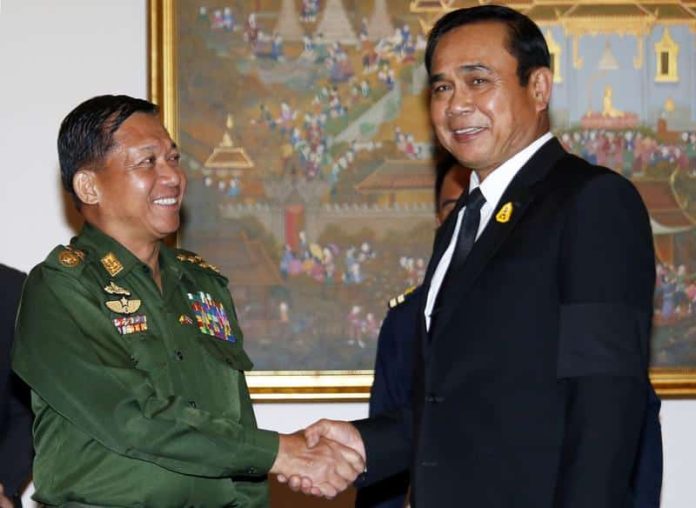The current effort by acting Prime Minister Prayut Chan-o-outgoing cha’s rule to appease and acknowledge the junta regime in Myanmar is not convincing. Gen. Prayut approved and backed Foreign Minister Don Pramudwinai’s exceptional haste in scheduling an ASEAN-wide ministerial meeting in Pattaya on June 18 with Than Swe, the newly appointed Foreign Minister of Myanmar by the junta. The cliched responses from the FM and PM, cloaked in controversy and desperation, just do not hold up. That raises the question of whether factors other than Thailand’s national interest are driving the departing government’s seeming backing of Myanmar’s military regime, which seized power on February 1, 2021.
Despite not having a mandate, Don sent out invites on June 14, four days before the high-level gathering was scheduled to take place. Don knew that he would soon have to resign from his position as well because the United Thai Nation Party, which is linked with the military and led by Gen. Prayut, lost the May 14 election. Such workshops, which he had previously and controversially supported, happened ahead of a Thai election. Moreover, Don and Pornpimol Kanchanalak, his special envoy to Myanmar, have made a special effort to arrange a number of “Track 1.5” think-tank conferences that feature Myanmar. The stated objective has come under fire for allegedly giving the State Administration Council (SAC), the junta government of Myanmar, legitimacy and respect. Thailand’s national interests are to be safeguarded by the rationalization.
Don and Gen. Prayut both repeated the standard litany of bilateral imperatives between Thailand and Myanmar. These include the fact that Thailand and Myanmar have a border that is more than 2,400 kilometers long. As such, Thailand and its neighbor must cooperate on issues that affect both countries, such as human trafficking, illegal drug and weapon trafficking, and criminal call centers that have drawn scammers from all over Southeast Asia and beyond. Thailand ranked third with 12.5 percent of all foreign investments in Myanmar at the same period, having invested over US$11 billion in 154 projects.
It was further claimed that the Thai government was compelled to take action by further sanctions imposed by the US and other Western nations on the SAC, specifically the Myanmar Foreign Trade Bank and Myanmar Investment and Commercial Bank. These justifications and arguments, however, fall flat.
With about twice as much invested as Thailand, Singapore is really the largest foreign investor in Myanmar, followed by China. However, starting in April 2021, the Singaporean government has taken the morally right course of abiding by the ASEAN Five-Point Consensus, which calls for an end to the violence, an inclusive dialogue, humanitarian aid, the appointment of a special envoy, and a delegation visit to determine the best course of action.
In fact, there are significant bilateral issues between Thailand and Myanmar with regard to labor migration, transnational crime, drug and arms trafficking, and even pollution from burning agricultural land. These challenges, however, are still present and even getting worse. For Thailand, Don and Pornpimol’s support of the SAC has not yet paid off.
Instead, they have damaged Indonesia’s standing as the current ASEAN chair, undermined ASEAN’s significant regional role, and damaged Thailand’s standing internationally. The great majority of Myanmar’s people have rebelled against the SAC, supported by a bloody civil war in which the military is losing and unable to establish control, due to Thailand’s dubious actions. Without powerful military weapons like armor and airstrikes, the Myanmar military might not win.
Don’s mistreatment of ASEAN and Indonesia as chair has damaged ASEAN’s reputation in the international community. Additionally, he has encouraged deeper divisions among ASEAN nations. Following the coup in Myanmar, ASEAN effectively split into two factions, with Singapore, Malaysia, Indonesia, and the Philippines supporting the restoration of democratic rule and the other countries opposing it. It is not unexpected that autocratic ASEAN nations—from Vietnam and Laos to Brunei and Cambodia—support the SAC while keeping quiet about its crimes against the Burmese people. Four ASEAN members have consistently chosen not to attend Don’s meetings, but these members have been present.
Under General Prayut’s foreign policy, Thailand stands out in relation to Myanmar’s SAC. The democratically elected Move Forward Party and its leader Pita Limjaroenrat, who has emphasized ASEAN centrality and the Five-Point Agreement, have predictably opposed Don’s latest move. It is important for all foreign actors to understand that the majority of Thais do not agree with the Prayut-led government’s position on Myanmar.
Thailand must undoubtedly communicate with the SAC, but it must do so cooperatively and in line with the ASEAN Five-Point Agreement with other parties, especially those stakeholders in the Burmese civil conflict, such as the opposing National Unity Government. Thailand, Myanmar’s neighbor, ought to collaborate closely with the chair of ASEAN to encourage convergence of opposition groups and to press the SAC to have discussions by using formal participation and recognition as leverage. The SAC has shown no mercy and no leniency thus far. Increasing the level of appeasement will only serve to strengthen and elevate the SAC. The dispersed resistance alliance must also come together and show that they have the cohesion and means to govern and preserve the nation.
The foreign minister asserted that he had to take action even though he was leaving as caretaker because Thailand’s national interests “cannot wait” for the incoming government. What cannot wait is arguable. Don and Pornpimol are well-known government officials, therefore people doubt their moral character and motivation. The public has a right to know if there are any private interests involved in this case since Pornpimol is a professional lobbyist who has been found guilty in a US court of law. A proper investigation into this issue ought to be carried out by the newly elected government with a mandate from the people.


